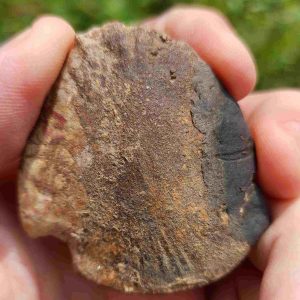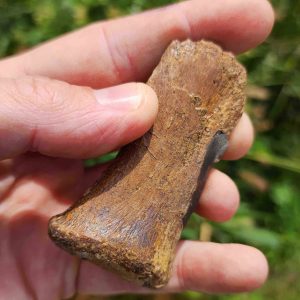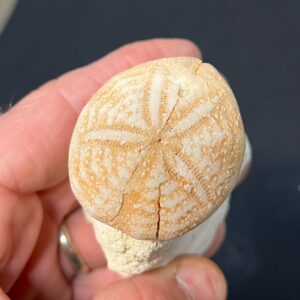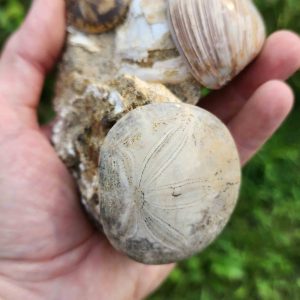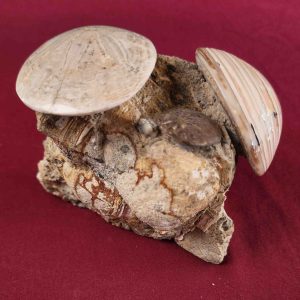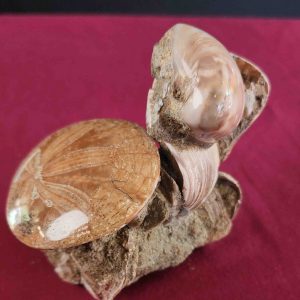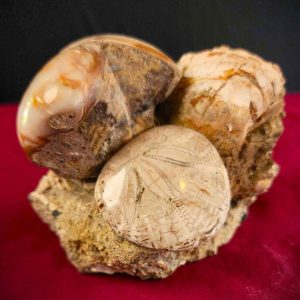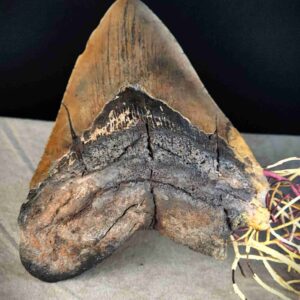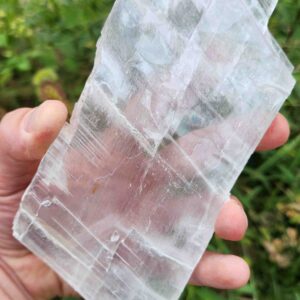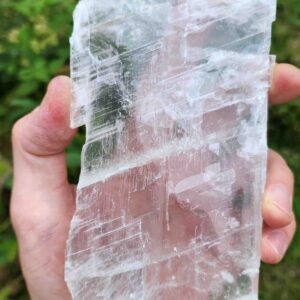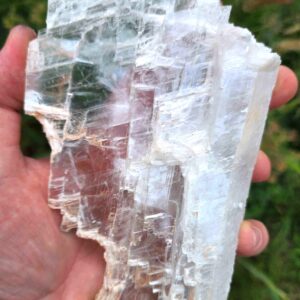-
Dinosaur Bones (D3)
Notes specific to this specimen: Commonly called the “hoof” of a hadrosaur – in this case Edmontosaurus – this is the end bone of a pes digit (toe). In vertebrates, the ends of the front appendages are called the “manus” (aka hand) while the back are called the “pes” (aka foot). The fine detail on the bone surface is remarkably well preserved. This piece has a small amount of reconstruction as shown in the dark paleoclay area.
SIZE: 3″ x 2″ x 3″
NAME: Edmontosaurus
AGE: Cretaceous Period – 68 million years
UNIT: Lance Creek Formation
SITE: Lance Creek, WyomingDATE: 1992
Documentation: This authentic fossil specimen comes with a Certificate of Authenticity and Origin.
$420.00Dinosaur Bones (D3)
$420.00 -
Dinosaur Bones (D4)
Notes specific to this specimen: This is a distal manus digit (“finger”) bone of Edmontosaurus. In vertebrates, the ends of the front appendages are called the “manus” (aka hand) while the back are called the “pes” (aka foot). The fine detail on the bone surface is remarkably well preserved. This piece has a small amount of reconstruction as shown in the dark paleoclay area.
SIZE: 3″ x 1″ x 1″
NAME: Edmontosaurus
AGE: Cretaceous Period – 68 million years
UNIT: Lance Creek Formation
SITE: Lance Creek, WyomingDATE: 1992
Documentation: This authentic fossil specimen comes with a Certificate of Authenticity and Origin.
$365.00Dinosaur Bones (D4)
$365.00 -
Fossil Echinoid (YT1)
Notes specific to this specimen: On rare occasions, we find some of these specimens with iron oxide staining that offers a nice contrasting coloration in the shell. This is a great specimen mounted on its native matrix with sawn-flat bottom so it displays nicely.
SIZE: 2″
NAME: Eupatagus antillarum
AGE: Eocene – 34 million years
UNIT: Ocala Limestone
SITE: Levy County, FloridaDocumentation: This authentic fossil specimen comes with a Certificate of Authenticity and Origin. In addition, an attractive and informative display card accompanies the specimen.
$85.00Fossil Echinoid (YT1)
$85.00 -
Fossil Echinoid (YT2)
Notes specific to this specimen: On rare occasions we find some of these specimens with iron oxide staining that offers a nice contrasting coloration in the shell. This is a great specimen mounted on its native matrix with sawn-flat bottom.
SIZE: 2″
NAME: Eupatagus antillarum
AGE: Eocene – 34 million years
UNIT: Ocala Limestone
SITE: Levy County, FloridaDocumentation: This authentic fossil specimen comes with a Certificate of Authenticity and Origin. In addition, an attractive and informative display card accompanies the specimen.
$85.00Fossil Echinoid (YT2)
$85.00 -
Fossil Sand Dollar and Clam (KH2)
Notes specific to this specimen: Matrix piece that has a flat bottom so it stands nicely. This specimen has one large and one infant sand dollar with a nice polished clam that has great colors.
SIZE: 5″x 3″x 3″
NAME: Psuedocardium & Dendraster
AGE: Pliocene Epoch – 4 million years
UNIT: Etchegoin Formation
SITE: Kettleman Hills, California
DATE: 2023Documents: This authentic fossil specimen comes with a Certificate of Authenticity and Origin. In addition, an attractive and informative display card accompanies the specimen.
$460.00 -
Fossil Sand Dollar and Clam (KH4)
Notes specific to this specimen: Beautiful and showy matrix piece with flat bottom so it stands nicely. This specimen has one large polished sand dollar and one infant sand dollar along with a great polished clam.
SIZE: 4″x 3″x 3″
NAME: Psuedocardium & Dendraster
AGE: Pliocene 4 million years
UNIT: Etchegoin Formation
SITE: Kettleman Hills, CaliforniaDocuments: This authentic fossil specimen comes with a Certificate of Authenticity and Origin. In addition, an attractive and informative display card accompanies the specimen.
$460.00 -
Fossil Sand Dollar and Clam (KH6)
Notes specific to this specimen: Exquisite large brown polished sand dollar with two great polished clams and some unpolished clams beside them. This is a matrix piece that has a flat bottom so it stands up nicely.
SIZE: 4″x 3″x 3″
NAME: Psuedocardium & Dendraster
AGE: Pliocene 4 million years
UNIT: Etchegoin Formation
SITE: Kettleman Hills, CaliforniaDocuments: This authentic fossil specimen comes with a Certificate of Authenticity and Origin. In addition, an attractive and informative display card accompanies the specimen.
-
Fossil Sand Dollar and Clam (KH9)
Notes specific to this specimen: One large polished sand dollar with two great polished clams. Matrix piece that has a flat bottom so it stands nicely.
SIZE: 4″x 2″x 3″
NAME: Psuedocardium & Dendraster
AGE: Pliocene 4 million years
UNIT: Etchegoin Formation
SITE: Kettleman Hills, CaliforniaDocuments: This authentic fossil specimen comes with a Certificate of Authenticity and Origin. In addition, an attractive and informative display card accompanies the specimen.
$395.00 -
Giant Fossil Shark Tooth with Coral
Notes specific to this specimen: An incredible find! Beautiful huge megalodon shark tooth with soft coral attachment. This 5 1/2″ specimen was discovered in 2000 on the bottom of the ocean off North Carolina and has been kept as found. It was discovered by the greatest shark tooth hunter ever – the late, great, Vito Bertucci – aka “Megalodon Man”. Vito was from the East Coast and well known as the most active collector of giant shark teeth ever and the creator of the largest shark jaw ever assembled. He passed away in 2004 while diving for teeth in the Ogeechee River, Georgia. There is some stabilization in the root but nothing has been done to the tooth itself other than cleaning it. Care has been taken to conserve the piece intact. Even the purple color of the soft coral is preserved. We traded for this from a private collector.
Tooth Size: 5 1/2″
NAME: Otodus megalodon
AGE: Miocene Epoch, 15 million years
SITE: Atlantic Ocean, North Carolina
DATE: 2000Documentation: This authentic fossil specimen comes with a Certificate of Authenticity and Origin.
$2,250.00Giant Fossil Shark Tooth with Coral
$2,250.00 -
Gypsum, Variety Selenite (AG1)
Notes specific to this specimen: Large crystals with nearly optical clarity. Modified rhomboid shape with nice clear crystal and no inclusions. Mirror shine faces, no scratches.
Size: 7″ x 3″ X 1″
NAME: Gypsum, variety Selenite
AGE: Triassic Period, 240 million years
UNIT: Moenkopi Formation
SITE: Mohave County, Arizona
DATE: 2019Documentation: This authentic fossil specimen comes with a Certificate of Authenticity and Origin. In addition, an attractive and informative display card accompanies the specimen.
$185.00Gypsum, Variety Selenite (AG1)
$185.00 -
Gypsum, Variety Selenite (AG3)
Notes specific to this specimen: Clean large rhomboidal crystal shape that is common in these crystals but not found in this size with this clean quality. Nice clear crystal with no inclusions. Mirror shine faces, no scratches.
Size: 6″ x 3″ X 1″
NAME: Gypsum, variety Selenite
AGE: Triassic Period, 240 million years
UNIT: Moenkopi Formation
SITE: Mohave County, Arizona
DATE: 2019Documentation: This authentic fossil specimen comes with a Certificate of Authenticity and Origin. In addition, an attractive and informative display card accompanies the specimen.
$185.00Gypsum, Variety Selenite (AG3)
$185.00 -
Gypsum, Variety Selenite (AG7)
Notes specific to this specimen: Very complex large modified rhomboid crystal pattern with mirror-clean faces. Nice clear crystal selenite with no inclusions. The very edges of some of the crystals show some wear but this only accents the beauty of the overall piece.
Size: 6″ x 4″ X 1″
NAME: Gypsum, variety Selenite
AGE: Triassic Period, 240 million years
UNIT: Moenkopi Formation
SITE: Mohave County, Arizona
DATE: 2019Documentation: This authentic fossil specimen comes with a Certificate of Authenticity and Origin. In addition, an attractive and informative display card accompanies the specimen.
$280.00Gypsum, Variety Selenite (AG7)
$280.00
Shop Our Catalog
- Browse All Products
- Agatized Algae
- Agatized Coral
- Cerdito Prospect Rift Crystals
- Rucks Pit
- Dinosaur Bones
- Exceptional Museum Specimens
- Fossil Echinoids
- Fossil Fern
- Gunflint Iron Rainbow Stromatolite
- Gypsum Selenite
- Iron Range Stromatolites
- Kettleman Hills Fossils
- Kona Dolomite
- Specularite
- Sudbury Impactite
- Volcanic Bombs

